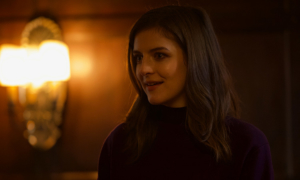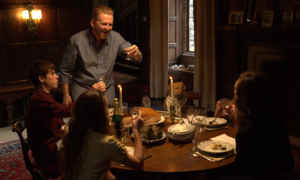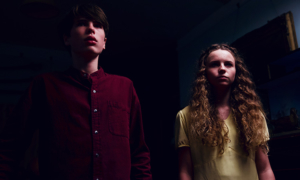In the debut feature from director Sebastian Godwin, Homebound finds Richard (Tom Goodman-Hill, Humans) deciding to take his new girlfriend Holly (Aisling Loftus, A Discovery Of Witches) home to meet his three estranged children, Lucia, Ralph and Anna.
However, they soon discover his ex-wife is missing and the children are behaving strangely. As their actions become gradually more disturbing, Holly begins to unearth a dark and twisted secret…
We spoke to Homebound star Tom Goodman-Hill about filming in a very creepy house and why he doesn’t want to tell you what he thinks of his character…
How did you first get involved with Homebound?
I was offered it very fortunately, by Seb [Godwin] and Hugo [Godwin, producer]. I’m pretty sure they lost their first-choice actor [haha], but I’m always very happy to pick up anything dropped by somebody else. So I read the script and just loved it.
I also knew that Aisling [Loftus] was doing it and Aisling and I had worked together on Mr. Selfridge but we hadn’t worked with each other very much on that show. We sort of worked alongside each other. So it was great to have the opportunity to actually work with her more extensively.
What did you like about the script?
I loved how fast the script is. How much of it is visual and atmospheric and how sparse the dialogue was – how much is left for the audiences’ imagination to fill in the gaps, which I think is crucial on a film like this. It doesn’t make any effort to explain who these people are and doesn’t make any effort to explain necessarily, why what happens, happens. It just fills you with a slow creeping dread and leaves you to try and find those solutions yourself.
I love films that do that. It doesn’t tie up all its loose ends too neatly and leave you with a sense that you don’t know exactly who you’re rooting for, or why, and whether what happens to each of the characters is necessarily just or well deserved. I think that’s a good thing. I don’t like loose ends to be tied up too easily.
How would you describe the tone of Homebound?
When people ask me about it, I call it ‘modern gothic,’ which I think I think pretty much sums it up. It’s an obviously modern setting, but the story I think is quite gothic. You think of Poe and Northanger Abbey – those are the novels that struck me as feeding into this story. They’re its ancestors I think.
We don’t find out too much about your character Richard in the movie, did you create a backstory for him?
Aisling and I just sat down and worked out between us what we thought their story was and then we had no intention of sharing it with anybody else!
That was our whole approach, but that doesn’t necessarily mean that everyone else needs to know what we’re doing. That was quite a fun thing to do. We knew where we were coming from, but we were very happy to leave it ambiguous for the viewer…

Where did you shoot the movie?
It was an amazing place called Wiveton Hall. Wiveton is on the seafront on the broads in North Norfolk, next to a village called Blakeney which is where most of us were staying. Quite a lot of us were staying in the house itself and others we just next door in the village, so we were all within a 10-minute walk of each other which was fantastic. That’s just a great way to work, when everyone’s in one place you don’t waste time with travelling. So you have an enormous amount of time to work. Everyone’s in the same place, everyone’s in the same boat and everything comes down to just making sure you do the best for the project that you’re working on.
Wiveton is the sixth character in the film. That house is all at once cosy and creepy. It’s an absolutely beautiful house and if you’re in the right mood, it’s the cosiest, most romantic house you’ve ever been in. If you’re in the wrong mood it’s the creepiest house you’ve ever been in! That’s the joy of it and that is what feeds into the film. It starts off looking inviting and familial and cosy and beautiful grounds and then the more you go into it, the more you go, ‘oh, this place is seriously fucked up!’.
You shot Homebound a while ago didn’t you…?
A good four and a half years ago. I think one of the joys of it for me was that Seb isn’t in a hurry. One of the lovely things about making this film is that you knew that Seb wasn’t going to do anything with it until he was completely happy. Obviously making it on a micro-budget you have to make sure that the funds that you have available to you are used to the best of your abilities, to serve the film the best way you can. So Seb was never in a hurry. He wanted to make sure that everything was right before we got any kind of release and was shown to the public. That’s a good position to be in. I think it shows great confidence for a director to be totally unhurried about it, and when it’s ready, it’s ready.
Homebound is full of incredibly tense moments, how do you go about shooting those scenes?
The great thing is Seb always let us run with the scenes. The dialogue is very sparse (which is what I really loved about it) which means that there’s an awful lot of work being done between the lines and we loved playing with that. Lingering with the dialogue, making the dialogue as menacing or perplexing, frustrating as you could do. Seb just let us run with it.
The approach to the dialogue was all very unhurried and that really worked because it meant that they could then play with it in the edit to increase the tension or take the air out of a situation accordingly. Things like the big party scene where we’re all dancing around, getting drunk – we did that half a dozen times, and each of those was completely different to the one before and the cut of it is chaotic and hilarious and slightly dark and then a bit menacing and then a little bit worrying and then ultimately terrifying! That came from just taking a run at each take and getting different things out of it on each occasion.

Richard has a pretty unusual relationship with his kids, how would you describe that relationship?
He feels threatened by them and he just doesn’t want to admit it to himself. His own kids terrify him. I think he feels he doesn’t have their respect and so he doesn’t know how to handle it. If they in any way challenge him, he just loses it. Which is quite a heavy mix. It’s a very, very strange relationship to have.
How did you go about shooting those intense scenes with Hattie Gotobed, Lukas Rolfe and Raffiella Chapman who play Lucia, Ralph and Anna?
We kind of went at them with a running jump. You just have to commit. Obviously, with scenes like that when you’ve got three children working with you, you’ve got to be careful to enjoy playing the scene but also you don’t want them to feel uncomfortable in a real sense. You can’t go giving child actors nightmares because of the way you behave!
When you’re working with actors of that age, you have to make them feel secure and feel like it’s okay, nothing terrible is going to happen. So a lot of time was spent kind of jumping up and down and getting very energised and then going ‘I’m really going to scream at you in this. I don’t mean it. I’m going to be so so careful. If anything goes wrong, just tell me’.
And obviously Seb is doing a lot as well, saying, ‘okay, let’s just feel our way through this but don’t worry, just stop if you feel like it’s too much’. So there was a lot of that going on. But actually, Hattie [Gotobed], Lukas [Rolfe] and Raffi [Raffiella Chapman] were all just incredibly up for it. I think Raffi, belying her incredibly angelic nature was the most up for it of all! Which is really good. It’s great. But we were very careful and we made sure that it was fun.

How do you go about choosing a project?
It all comes down to the script. Make sure that you love the script and that it’s something you want to work on. That was the primary thing. Script for me is always king and I think the same is true of every film I’ve worked on. What attracted me to Everest was that it was an incredible story; two teams of climbers in a completely unforgiving and impossible situation and the thrill of being able to go up a mountain and feel what that’s like and be a part of a team and a crew that are all working towards something thrilling like that is completely irresistible.
The same is true of The Imitation Game. It was just one of those stories that was overdue being told and so the same rules apply. You go to the script first, above everything else and if that feels good to you and you’re happy to do it, then all projects eventually level themselves out. That’s my attitude really. Look at the script first and if you love it, do it.
What do you want for audiences to take away from Homebound?
It’s so individual to each person that watches it. I think one of the joys of the film is you don’t exactly know what the history of that family is and you don’t exactly know what’s happened in that house. The way you receive it is very much dependent on your own mindset, and your own values and your own morals. So you take away from it whatever you put in.
I think that’s the joy of it. It questions how people interact with their own children, with their own partners and it’s asking questions of you that it’s up to you to answer for yourself. The nature of the film is that it’s not seeking to answer any of those questions for you. If anything, it’s raising questions in yourself about what your attitude to those events are. If you’re watching it with a loved one or someone you respect or work with or anything like that, your values are going to be different to the person next to you and the conversation you have about it as you leave is going to be very interesting as a result.
I think the best films do that. The best films make you question your own mindset…
